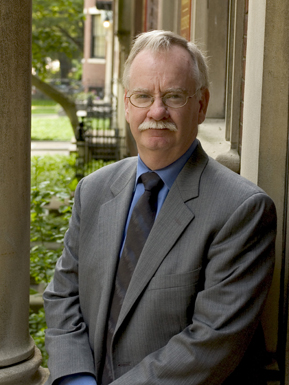An Honors College Emerges
New focus on linking disciplines, but no new degree

Beginning this spring, Boston University will invite a select number of incoming 2010 freshmen to enroll in a new four-year, University-wide undergraduate program called the University Honors College, designed to include cross-disciplinary classes, intensive seminars, and independent studies for seniors.
“It’s important for institutions of higher learning to be continually developing the best and most innovative ways to reach its students,” says President Robert A. Brown. “The University Honors College allows students to have an interdisciplinary perspective while maintaining focus on one of our excellent existing schools and colleges.”
Unlike the University Professors Program, which stopped accepting applications two years ago, the University Honors College will not be a separate degree-granting college within BU. Rather, the emphasis will be on bringing together students in all existing liberal arts and professional programs, allowing them to work on interdisciplinary, collaborative research.
University officials announced the creation of the program in spring 2008, tentatively calling it New College. The name proved unpopular, and last week Brown recommended to the Board of Trustees renaming it the University Honors College. The trustees agreed unanimously.
“The name New College was only provisional — a placeholder,” Brown says. “In the beginning, it worked because it allowed us to define what the program should be.”
As the University Honors College will not offer a separate degree, it will not have a separate dean. “It is not a replacement for, or in competition with, any of the existing schools or colleges,” says Charles Dellheim, chair of the College of Arts & Sciences history department and the head of the Committee to Design the University Honors Program. “It is a cooperative enterprise that we hope will be a source for — and a beneficiary of — rigorous innovation across BU.”
The college will provide an open dialogue between professional schools and the liberal arts and sciences, adds Provost David Campbell. Students will continue to satisfy requirements for existing majors, while taking advantage of a new interdisciplinary structure. “Students completing the University Honors Program will have this distinction recognized on their diplomas,” Brown says.
According to Dellheim, the program will build on three strengths: the University’s standing as a research institution, its strong liberal arts and professional schools and colleges, and its Boston location. “This is an attempt to redefine the balance by making research and creation a significant part of the undergraduate curriculum,” he says.
The broader concept will expose students to a variety of disciplines as well as a variety of pedagogies, he adds, including case method, master classes, studios, and laboratories.
This fall, CAS began offering freshman seminar courses that could become University Honors College courses in 2010. Although offered through CAS, they were taught by faculty members from schools and colleges throughout the University, including the College of Engineering, the College of Fine Arts, and the School of Theology. Thus far, Dellheim says, feedback from instructors has been positive.
The proposed curriculum encompasses all four years of an undergraduate program and features two semester-long freshman seminars, two semester-long sophomore discussion classes, a one-semester junior year course, and a keystone research project during senior year. Students will also complete an internship during the summer of sophomore year.
The program will allow for closer interaction between students and faculty, smaller class sizes, and a specialized curriculum, Dellheim says.
Freshman courses will focus on research, creation, and discovery involving fine arts, philosophy, management, history, literature, and engineering. Sophomore courses will take a comparative look at practices of inquiry across the arts, sciences, and professions. Juniors develop a detailed proposal for their keystone project, to be carried out senior year.
Collaboration on keystone projects will be highly encouraged. “For example,” says Dellheim, “a painter from CFA might work with an art history major from CAS and a marketing major from SMG to open an art gallery.”
According to Laurie Pohl, vice president for enrollment and student affairs, freshmen will be selected based on “their interest and drive to understand issues from multiple perspectives and synthesize strands of information into a coherent whole.” Students will be invited to join the inaugural program in the spring.
Reaction to the disbandment of the University Professors Program had been mixed. “There were some who had concerns about how it would affect other programs and what impact it would have on resources,” says Dellheim. “But I think that, for the most part, people were highly supportive.”
“Although successful in attracting students, UNI was always a small program,” Pohl adds. “The University Honors College expands on the notion of academic talent to include academic potential, allowing more students to benefit.”
Andrew Smolenski (SMG’09, UNI’09), former president of UNI’s student government, worked with Dellheim throughout the 2007–2008 academic year to develop the concept of the new entity. “Our biggest concern with discontinuing UNI was the fate of its interdisciplinary concentrations,” he says. “We were asked to come up with ideas for set majors that might replace the interdisciplinary concentrations, what classes we thought they should draw from, and what professors should be involved.”
The last group of UNI freshmen entered in 2007; the college will officially close when they graduate in 2011.
Vicky Waltz can be reached at vwaltz@bu.edu.
Comments & Discussion
Boston University moderates comments to facilitate an informed, substantive, civil conversation. Abusive, profane, self-promotional, misleading, incoherent or off-topic comments will be rejected. Moderators are staffed during regular business hours (EST) and can only accept comments written in English. Statistics or facts must include a citation or a link to the citation.